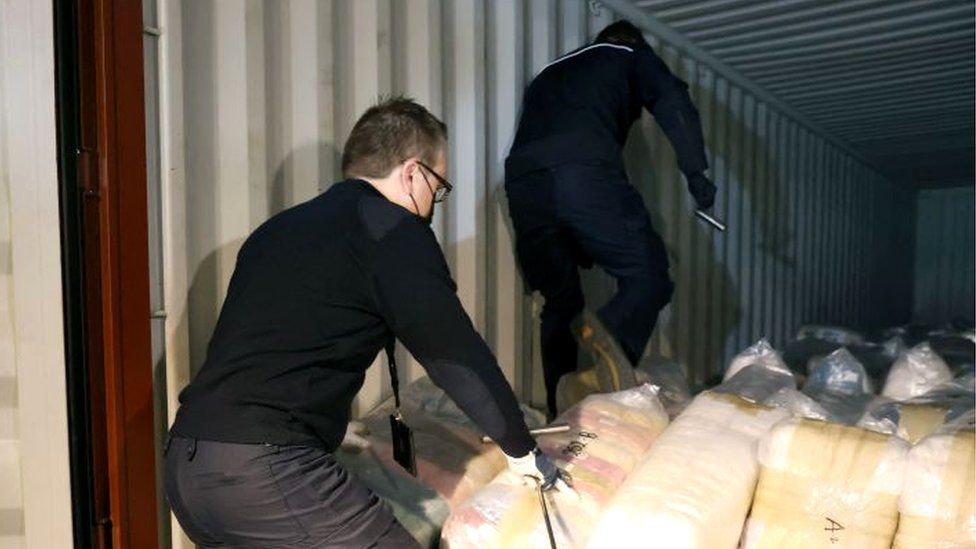-

-
-
Loading

Loading

Belgium had a record seizure of cocaine at the port of Antwerp last year, according to authorities. The port city has become the main entry point for the drug in Europe, coming from South America. Belgian Finance Minister Vincent Van Peteghem reported that 116 tonnes of cocaine were seized in Antwerp, representing a 5% increase compared to the previous year. However, it is believed that only a small fraction, possibly as little as a tenth, of the drug is actually detected upon arrival at the port. Customs officials have openly confessed that they will never succeed in defeating the powerful cartels. The rise in the illegal drug trade has resulted in escalating violence in Belgium as gangs compete for control of the highly profitable cocaine market. Minister Van Peteghem expressed concern about the huge threat posed to the safety of the ports, cities, and numerous customs and dock workers, as well as the general public. Driving through the vast port in Antwerp, one can easily see why the cocaine gangs have chosen it as their primary import hub, and it becomes clear how daunting the task is for authorities in combating this issue. With approximately 160km of quayside, where millions of tons of goods are unloaded daily for distribution across Europe, the port provides an ideal opportunity for drug traffickers. Hiding drugs inside crates of fresh fruit, particularly banana containers, remains a favored strategy. During a previous investigation by the BBC into Antwerp's emergence as Europe's foremost entry point for cocaine, customs officials admitted that gangs anticipated a portion of their shipments being intercepted, and had factored this into their operations. Nevertheless, the profits continue to be substantial. Belgian authorities reported that 2022 was the first year they seized over 100 tonnes of drugs at the port in a single year. Belgium's neighboring country, the Netherlands, has also experienced a significant increase in cocaine confiscations, with 59.1 tonnes seized in 2023. This has cemented the Netherlands' position as a distribution hub for various parts of Europe, including the UK. Ecuador was identified as the primary source for cocaine seized in the Netherlands, accounting for almost 27 tonnes. Panama and Colombia are also key countries of origin, supplying primarily Belgium, the Netherlands, and Spain. Law enforcement agencies throughout Europe are collaborating to combat these criminal networks. They have highlighted recent successes, such as the decryption of the EncroChat platform, used by traffickers. An anti-drugs operation in Belgium resulted in the arrest of 22 individuals, including three police officers, with multiple searches conducted in Brussels and Antwerp. Cash, expensive cars, and a weapon were seized by federal police. Antwerp has experienced a surge in violence in recent years, predominantly in the form of gang conflicts on the city's streets. Many of these attacks have targeted incorrect addresses, and in January 2023, an 11-year-old girl was tragically killed in an underworld assault. Drug-related violence has now spread south of the port and into Brussels. Rival gangs often shoot at the homes of their rivals, not necessarily with the intention to kill, but rather to alert authorities to drug-dealing activities occurring within the property. Senior European officials have likened the violence and disruption caused by organized crime to that of terrorism. Former Belgian Minister of Justice Vincent Van Quickenborne was forced to seek refuge in a safe house after an alleged plot by Dutch criminals to kidnap him was uncovered. Dutch Acting Prime Minister Mark Rutte also faced heightened security measures due to fears that a cocaine gang might target him. Belgium is currently conducting a massive trial with over 120 defendants facing various drug-related charges.